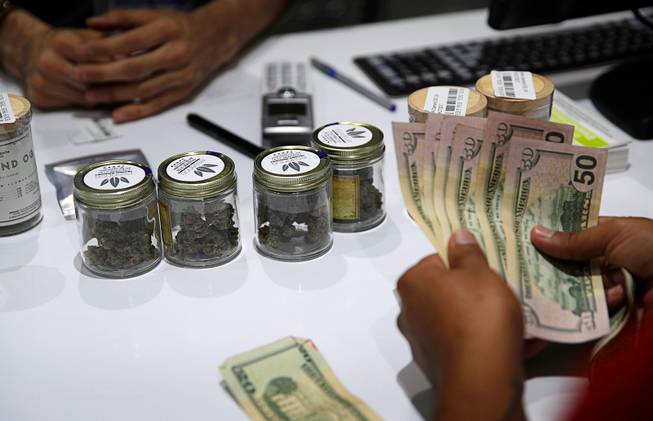
John Locher / AP
A customer buys marijuana at the Essence cannabis dispensary in Las Vegas, July 1, 2017.
Friday, Dec. 14, 2018 | 2 a.m.
Related news
After months of speculation, more than 60 new recreational marijuana dispensary licenses were awarded last week by the Nevada Department of Taxation to business owners currently operating licensed pot facilities.
And despite state legislative efforts to diversify ownership in the expanding industry, only about 10 of roughly 150 applicants for the new pot stores received licenses. To the dismay of some in the industry, those who were granted the new licenses received them in large quantities.
While the department has not publicly released information on which entities were awarded licenses — stating privacy until the business is operational — a combination of company announcements and information from industry sources has provided a list for 54 of the 61 licenses issued:
Verano (Zen Leaf): 11
Essence Cannabis Dispensary: 8
Green Growth Brands (The+Source): 7
Tap Roots: 7
Thrive: 6
Deep Roots: 6
MPX (GreenMart): 4
Nevada Made: 3
Green Therapeutics: 1
Of the 61 licenses, 10 were issued in Las Vegas, 10 in unincorporated Clark County, six in Henderson and five in North Las Vegas. Another 20 combined licenses were issued for the 14 Nevada counties that don’t permit recreational marijuana sales, meaning only 41 of the new dispensaries are likely to open during the next year.
The licenses are conditional, meaning the pot stores must begin operating within 12 months or the licenses will be rescinded. Dispensaries also require local approval to open for business.
The application process was open to pot license holders, including those operating cultivation and production facilities in addition to dispensaries. Only testing lab owners were left out of the latest batch of applications. There are 65 operational dispensaries in Nevada.
Department of Taxation spokeswoman Stephanie Klapstein said applications were graded on a 250-point scoring system by department administrators, with the most points given for detailed descriptions of the company’s ownership, officers and board members as well as the proposed facilities’ plans to track pot sales and ensure building safety.
Applicants’ financial plans, proposals to comply with state regulators, marijuana education initiatives for staff and customers, and plans to minimize environmental impact were also heavily factored. Each application cost $5,000; applicants were required to prove they had at least $250,000 in liquid capital.
Applicants could only earn one dispensary license per local jurisdiction, meaning those who received multiple licenses applied for dispensaries in multiple jurisdictions across the state, Klapstein said.
Officials awarded the top applications for each county or city a license for as many as they were able to give out in each jurisdiction. Per Ballot Question 2, which legalized recreational marijuana starting Jan. 1, 2017, local jurisdictions have a cap on number of dispensary licenses that can be issued by the state. That limit is based on the jurisdiction’s population.
“The process we used to score and rank the applications was transparent, rigorous and ensured the most qualified businesses in each jurisdiction received licenses,” said Bill Anderson, the taxation department’s director.
Frank Hawkins was among dozens of current marijuana facility owners to be shut out. Hawkins, who co-owns Nevada Wellness Center Dispensary on 3200 S. Valley View, said he applied for four licenses — in Reno, Clark County, Las Vegas and North Las Vegas — hoping for at least one. But after being told last week his dispensary wasn’t chosen for expansion, he’s asking the state to re-score his applications.
The state’s refusal to release the list of license winners nor the score of winning applications didn’t sit well with Hawkins.
“I don’t know why they’d want to hide that,” Hawkins said. “I have as many questions as the next person.”
Klapstein said new license holders will be added one by one to the department’s online list of active licenses as their new dispensaries open. Per department regulations for recreational marijuana, the names of any person who opens a pot business is kept confidential, but the department publishes information found on a mandatory seller’s permit that dispensary owners must post in a visible spot – including the address, dispensary name and business entity.
The list could take a year to be released, when all of the newly allotted dispensary licenses are either in operation or have been rescinded by state officials.
John Laub, director of the Las Vegas Medical Marijuana Association, said the state’s largest medical pot advocacy group would have liked to see more widespread distribution of the licenses.
“As a state, we need to increase the diversity of ownership,” Laub said. “It’s good for the industry and the state.”
Nevada state Sen. and Clark County Commissioner-elect Tick Segerblom also criticized the lack of transparency but lauded the taxation department for processing 462 total applications since the Sept. 20 deadline and making their allocation decisions on time. Segerblom said that as county commissioner he’d be open to asking the state for more dispensary licenses to meet demand down the road.
Inyo Fine Cannabis Dispensary owner David Goldwater was among others to be shut out. An executive member of the Nevada Dispensary Association, Goldwater applied for four licenses, hoping for at least one. Goldwater, like other owners who were denied a license, elected not to comment.
Riana Durrett, executive director of the Nevada Dispensary Association, also declined comment.
CORRECTION: Sahara Wellness did not receive one of the new recreational marijuana dispensary licenses as initially reported in this story. | (December 19, 2018)
